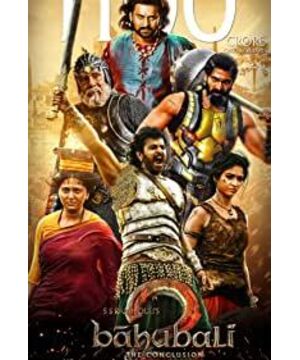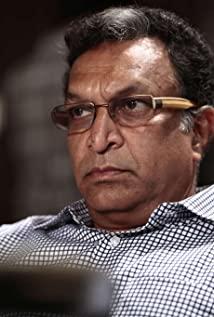01 God-like hero
When I finished watching "Baahubali: The Beginning", I always felt that the unfinished story came to an abrupt end. The last sentence of the first movie is when Capata says he's a traitor, and then the story ends. At the time I thought the movie ended so casually. Even if there is a sequel, I personally feel that it is better to divide it naturally when it is segmented. Certainly many aspects of the first film impressed us.
After watching "Baahubali 2", the plot line of the story is finally clear. Of course, the ending of the story is the same as everyone imagined. The bad guys are punished, the good guys are rewarded after all, and all the hardships you have endured will become the cornerstone of your success. In the end, the prince who came back with revenge killed his father-killer, saved his mother, and became the new king.
I don’t know why, when I watched these two films, although many things in them changed my view of Indian films a lot, but from the perspective of the subject matter of the stories, I always felt a bit like our Chinese mythology. The only difference from Chinese mythology is that they are more specific and realistic.
Whether it is King Baahubali or the son of King Baahubali, people think of the word "natural power", perhaps it is related to their culture. In terms of character building, they are different from others from the beginning. Since childhood, he has been wiser than others, wiser than others, and has magical powers that ordinary people do not have, and his appearance is also different.
There are scenes of them fighting against nature, as if in their eyes, conquering the whole world is expected. This is from the process of Shiva climbing to the top of Wanzhang Waterfall in the first part, and the war of King Baahubali saving the kingdom of Kundala in the second part. If you analyze it in detail, it is inconceivable in one word. At least my common sense tells me that it is very difficult for a person to climb a cliff that has been washed by running water for many years; a climbing rope woven from local materials cannot bear a person's weight; a person opens the gate and diverts water, and the enemy is washed away. , not so good, he found a piece of driftwood to swim back...
Of course, this is just one of the points. Regarding the word incredible, it is also reflected in the battle. Every time I see them fighting with people, I always feel that they are not fighting people, but ants. Although the scene design is very cool, it always feels out of touch with reality. And every time the male protagonist lifts a heavy object easily, he looks handsome, but reason always protests: it's too exaggerated.
In short, after watching a scene, I feel that the male protagonist is not a human being, but a god.
02 Jealousy blinds the eyes
I don't know why, when I watched "The King of Baahubali", a previous TV series "The King of Lanling" floated in my mind, and I thought of the sentence "History is always strikingly similar". People who are too beautiful are ultimately destroyed by people with ulterior motives.
The second half of the first part tells about the deeds of King Baahubali from childhood to adulthood, including the aspects in which he was much better than his elder brother during his growth. The same wisdom and courage, but he is more benevolent, he is more than his elder brother. won the hearts of the people. In the end, he became the crown prince, but because of this, he gained the grudge of his brother.
At the beginning of the second part, King Baahubali became the crown prince, and his last mission was to travel the country. Then he met his sweetheart there. His older brother was impressed by the beauty of the princess, but at the same time, he didn't want to let his younger brother agree, so he used a plan to ask for marriage in advance. The Queen Mother was furious and asked King Baahubali to bring the princess back.
At first everyone thought that the queen mother was seeking a marriage for King Baahubali, but later found out that it was not, and King Baahubali gave up the throne in order to be with his beloved and became a general who guarded the country. His mother could not forgive him in this matter, believing that he disobeyed his mother because of a woman, and did not take her mother seriously. All the hearts of the people are towards Baahubali. The reaction of the people again stirred his brother's grudge, and he vowed to kill him.
Afterwards, the elder brother's cronies had four fingers cut off by the princess because they wanted to take advantage of the princess, and then the princess was brought to court. King Baahubali killed the henchman in a fit of anger. His brother took the opportunity to accuse him of disobeying the imperial power, and his mother and queen did not understand, so they were directly demoted to commoners.
The people still respect them very much. King Baahubali also taught them a lot of skills in the process of getting along with the people. The people’s backs are still on King Baahubali. This scene was seen by his brother. He thought that as long as he was there, no one in the country would remember him as a king. So he sent Katapa to kill Baahubali again with the help of the Queen Mother. The empress dowager's obsession, the elder brother's incitement, and finally Katapa accepted the order. At this time, the child of King Baahubali is about to be born. Katapa was caught again, so he was going to save him.
In order to save Katapa, King Baahubali was seriously injured, and the last fatal blow was given by Katapa. When fighting the enemy before, King Baahubali said: "With my uncle (Katapa) here, you will not let me die." He was killed on the order of the Queen Mother, and his last words were for Katapa to take good care of his mother.
What is even more unexpected is that after the death of King Baahubali, his brother destroyed his body one by one in order to understand the hatred in his heart. At this time, all the problems came to light. Katapa knew the truth, and when he brought the bad news of King Baahubali to the Queen Mother, he also brought it to her. In addition to shock, of course she regrets. All she can do is to elect Baahubali's child as the new leader of the country, but at this time her own son was well prepared. In the end, she escaped with her grandson and used her life to protect the child. down. Baahubali's wife was imprisoned for twenty-five years, after which their children returned.
For many years after that, in order to completely destroy his brother's dignity, the elder brother of King Baahubali ordered the whole country not to mention his name again, intending to erase this name from everyone's memory. He also had his people build his golden statue, intending to live forever in the hearts and memories of the people. However, when someone started mentioning that dusty name again many years later, he was the source of strength in everyone's heart.
In fact, after watching the whole movie, we can see that the heroes in the movie are like gods. He is brave and resourceful, and won the love of the people. He also loves the people like a son. He married a beautiful princess in his life. He should have a good future. He used his wisdom to expand the territory and realize a greater ideal. However, all this was ruined in a calculation. And many times, the hurt of people who are too close is unexpected. Many times human beings can surpass everything and even conquer nature, but sometimes, the human heart has become an invincible terminator for human beings. And once a person develops jealousy, his subsequent behavior will become crazy.
03 From barbarism to democracy
Of course, the theme of the movie is still on the promotion of justice. In the end, the bad guys are punished and the good guys can finally be reunited. The first decree promulgated after King Baahubali's son Mahenda came to the throne was "In the future, if anyone intentionally hurts others, he will be severely punished by the law." This is the sublimation of the whole movie. The ideal way to stop what hurts people is to have it banned.
In fact, when I watched "King of Lanling" again, I felt the same way. The original genius of the first generation can save the people. How can he be so good, so good that even his relatives will hold grudges, coupled with the temptation of power, family affection seems to be less important at that moment. So it can't help but feel a little sad: when a person's desire is too strong, it will overwhelm his reason, making him a person more terrible than the devil.
Of course, it doesn't mean that people can't be motivated. It's a good thing to have that kind of heart, but after all, we "do something, and we don't do something." The more we want to get close to success, the more rational we should actually be.
Looking at the contents of the two films together, in addition to seeing the story models of "Prince's Revenge" and "Agarwood Saving Mother", we can see that it is a country and a nation slowly becoming democratic. Among the reasons that Baahubali was chosen as the crown prince from the first book of Baahubali, there is one thing that Bara does not have is that he has the life and death of the people in his heart. On the battlefield, it is important to be able to kill the enemy, but it is the God in the hearts of the people who can bring down the people. As Baahubali grew up, he threw aside many hierarchies and even ate with his slaves. When he was demoted as a commoner, he ate and lived with the common people, and also taught his skills to the common people, etc.
On the contrary, his elder brother Bara, it should be said that he is equally good, but lacks the heart of benevolence. In the war that decided the crown prince, in order to eliminate the enemy's leader, he ignored the human shield put up by the enemy army and killed the people of his own country. During his rule, the streets were full of slaves, many of whom were always hanged and beaten. When casting a golden statue for him, because the project was too large, the people of their country were also pulled over to work...
By contrasting such an image, we can see a historical trend: from barbarism to democracy. Of course, another theme we see in this film is respect for women's rights. This is different from what we learned earlier about Indian women who have no social status. Later, I checked the Internet, and it turned out that this tradition of South India, while we were looking at the reality of North India before. A movie can restore the story of an era to later people, and let us see many situations at that time. That's the beauty of movies!
View more about Baahubali 2: The Conclusion reviews











